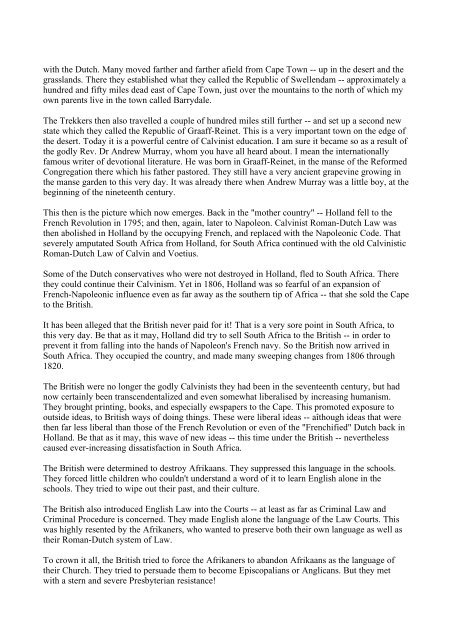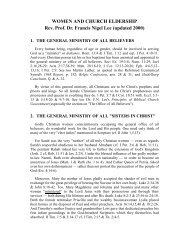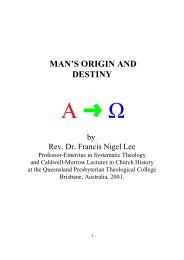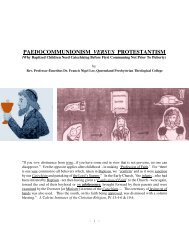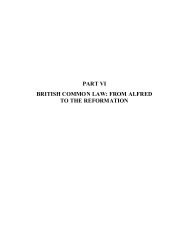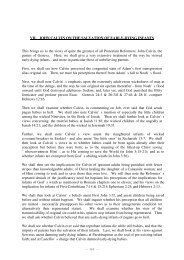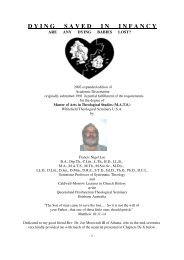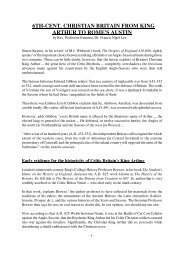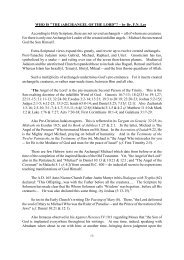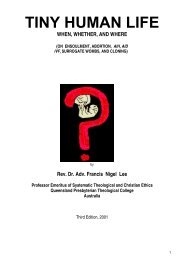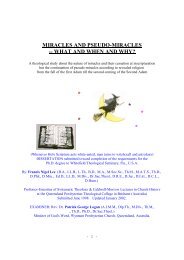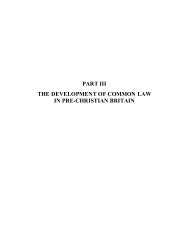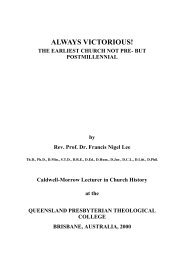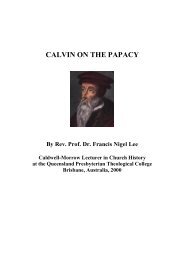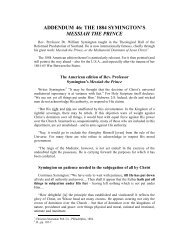Now the word "Kaffir" is an Arabic word, meaning infidel or unbeliever -- viz. one who is not aMoslem. When an Arab calls a person a Kaffir, he means that the person to whom he is speaking isnot a Moslem. From that point <strong>of</strong> view, Christian Whites are all Kaffirs! However, when theWhites asked the Blacks what the Blacks were called, the Blacks told the Whites what the Arabslave-traders had told the Blacks. <strong>The</strong>y said: "We are Kaffirs." By this they meant that the lightskinnedSemitic Mohammedan Arab slavers had called them Kaffirs (vîz. non-Moslems or pagans).<strong>The</strong> word Kaffir in South Africa has become a word <strong>of</strong> abuse which most Blacks resent. <strong>The</strong>ywrongly think that the Whites calling them Kaffirs are implying they are not Christians, while allthat would be implied is that they are not Moslems. In that sense, I myself would certainly want tobe a Kaffir or a non-Moslem! Today, however, the word gives <strong>of</strong>fence and should certainly not beused except in a historical sense.So there were ten "Kaffir Wars," between pagan Blacks and Christian Whites. <strong>The</strong>se ten warsended rather conclusively in the destruction <strong>of</strong> Black military power, and the dominance <strong>of</strong> theWhites on the eastern frontier. Again, the principle <strong>of</strong> separation was stressed. Again, there was tobe separation between the Black-inhabited area to the northeast <strong>of</strong> the boundary and the Whiteinhabitedarea to the southwest <strong>of</strong> this boundary.By 1795, there were 20 000 Afrikaans speaking Whites in South Africa. This is an appropriateplace at which to quote the Encyclopaedia Britannica, in its articles on South Africa. <strong>The</strong>y are verybiased against South Africa. That makes the weight <strong>of</strong> what I am about to cite, all the moreimpressive!<strong>The</strong> 1973 liberal Encyclopaedia Britannica, in its article on South Africa, says: "Although all the[White] Trekkers who were trekking northward and eastward through South Africa were extremeindividualists and some were ruffians, most <strong>of</strong> them did contrive to preserve a sound domesticmorality." In other words, according to the Britannica, they had an honourable family life!<strong>The</strong>y were not unlearned, concedes the Britannica, for "they strove to preserve a smattering <strong>of</strong>literacy!" <strong>The</strong>n it adds, apparently trying to deprecate them: "<strong>The</strong>y read almost only the Bible andtheir Catechism."I myself cannot think <strong>of</strong> anything better to read -- than the Bible and the Catechism! Indeed, theBritannica concludes that "they did also preserve a respect for their religion, a rather strict form <strong>of</strong>Calvinism."Well, Afrikaner Christians can be proud to be described by Humanists, in the Britannica, that way.Even though these descriptions were hardly intended to be compliments!<strong>The</strong>se movements <strong>of</strong> the Trekkers continued. Thus, various Calvinistic republics began to be set up<strong>of</strong> the frontier -- as the discontent <strong>of</strong> White South Africans increased toward the far-away andautocratic Dutch mother country.It is significant that these first Calvinist republics were set up by White South Africans at the verytime Holland succumbed first to the French Revolution and thereafter to Napoleon. I do not believethe White South Africans then had sufficient international insight to understand the terrible plightthat "mother Holland" was going through at that time. Indeed, the Dutch Calvinist monarchy wasbeing destroyed and overrun first by liberal leftists -- and then by the autocratic and bizarre andviciously anti-Dutch and anti-Calvinistic Napoleon.Yet at the very time Holland was going down, the South Africans reached the end <strong>of</strong> their tether
with the Dutch. Many moved farther and farther afield from Cape Town -- up in the desert and thegrasslands. <strong>The</strong>re they established what they called the Republic <strong>of</strong> Swellendam -- approximately ahundred and fifty miles dead east <strong>of</strong> Cape Town, just over the mountains to the north <strong>of</strong> which myown parents live in the town called Barrydale.<strong>The</strong> Trekkers then also travelled a couple <strong>of</strong> hundred miles still further -- and set up a second newstate which they called the Republic <strong>of</strong> Graaff-Reinet. This is a very important town on the edge <strong>of</strong>the desert. Today it is a powerful centre <strong>of</strong> Calvinist education. I am sure it became so as a result <strong>of</strong>the godly Rev. Dr Andrew Murray, whom you have all heard about. I mean the internationallyfamous writer <strong>of</strong> devotional literature. He was born in Graaff-Reinet, in the manse <strong>of</strong> the ReformedCongregation there which his father pastored. <strong>The</strong>y still have a very ancient grapevine growing inthe manse garden to this very day. It was already there when Andrew Murray was a little boy, at thebeginning <strong>of</strong> the nineteenth century.This then is the picture which now emerges. Back in the "mother country" -- Holland fell to theFrench Revolution in 1795; and then, again, later to Napoleon. Calvinist Roman-Dutch Law wasthen abolished in Holland by the occupying French, and replaced with the Napoleonic Code. Thatseverely amputated South Africa from Holland, for South Africa continued with the old CalvinisticRoman-Dutch Law <strong>of</strong> Calvin and Voetius.Some <strong>of</strong> the Dutch conservatives who were not destroyed in Holland, fled to South Africa. <strong>The</strong>rethey could continue their Calvinism. Yet in 1806, Holland was so fearful <strong>of</strong> an expansion <strong>of</strong>French-Napoleonic influence even as far away as the southern tip <strong>of</strong> Africa -- that she sold the Capeto the British.It has been alleged that the British never paid for it! That is a very sore point in South Africa, tothis very day. Be that as it may, Holland did try to sell South Africa to the British -- in order toprevent it from falling into the hands <strong>of</strong> Napoleon's French navy. So the British now arrived inSouth Africa. <strong>The</strong>y occupied the country, and made many sweeping changes from 1806 through1820.<strong>The</strong> British were no longer the godly Calvinists they had been in the seventeenth century, but hadnow certainly been transcendentalized and even somewhat liberalised by increasing humanism.<strong>The</strong>y brought printing, books, and especially ewspapers to the Cape. This promoted exposure tooutside ideas, to British ways <strong>of</strong> doing things. <strong>The</strong>se were liberal ideas -- aîthough ideas that werethen far less liberal than those <strong>of</strong> the French Revolution or even <strong>of</strong> the "Frenchified" Dutch back inHolland. Be that as it may, this wave <strong>of</strong> new ideas -- this time under the British -- neverthelesscaused ever-increasing dissatisfaction in South Africa.<strong>The</strong> British were determined to destroy Afrikaans. <strong>The</strong>y suppressed this language in the schools.<strong>The</strong>y forced little children who couldn't understand a word <strong>of</strong> it to learn English alone in theschools. <strong>The</strong>y tried to wipe out their past, and their culture.<strong>The</strong> British also introduced English Law into the Courts -- at least as far as Criminal Law andCriminal Procedure is concerned. <strong>The</strong>y made English alone the language <strong>of</strong> the Law Courts. Thiswas highly resented by the Afrikaners, who wanted to preserve both their own language as well astheir Roman-Dutch system <strong>of</strong> Law.To crown it all, the British tried to force the Afrikaners to abandon Afrikaans as the language <strong>of</strong>their Church. <strong>The</strong>y tried to persuade them to become Episcopalians or Anglicans. But they metwith a stern and severe Presbyterian resistance!
- Page 1 and 2: THE CHRISTIAN AFRIKANERSA Brief His
- Page 3 and 4: God richly bless the following lect
- Page 5 and 6: There have always been, and always
- Page 7 and 8: But the only one they both appeal t
- Page 9 and 10: Now Zuidema was a very great Dutch
- Page 11 and 12: Dutch churches at the Synod of Dord
- Page 13 and 14: station -- to help the Dutch ships
- Page 15 and 16: It is a country dedicated to freedo
- Page 17: 1760 -- there was more and more dis
- Page 21 and 22: said: "The British have placed our
- Page 23 and 24: financed by White money. It is buil
- Page 25 and 26: Famous Boer Generals, left to right
- Page 27 and 28: Three: Unannihilated: the Resurrect
- Page 29 and 30: (who had arrived in the country onl
- Page 31 and 32: of success.I may add that White Sou
- Page 33 and 34: General Beyers felt that those text
- Page 35 and 36: Balfour Declaration. The gist of it
- Page 37 and 38: Africa; treks on into the land both
- Page 39 and 40: Four: The Eschatology of Victory in
- Page 41 and 42: ide -- to use the instrumentality o
- Page 43 and 44: Christian National Calvinist Public
- Page 45 and 46: through constitutional process it h
- Page 47 and 48: I guess the best way to describe Sm
- Page 49 and 50: He was followed after his assassina
- Page 51 and 52: So the Scots came. I am going to sp
- Page 53 and 54: the Reformed Church in South Africa
- Page 55 and 56: ook on Hebrews. But his greatest wr
- Page 57 and 58: At that point, Du Plessis enquired
- Page 59 and 60: Yet quite apart from this high view
- Page 61 and 62: One last point. There is a tremendo
- Page 63 and 64: African Republic in 1902, the Cape
- Page 65 and 66: One of the most important Calvinist
- Page 67 and 68: Pellissier, who wrote on music and
- Page 69 and 70:
perspective -- even while he minist
- Page 71 and 72:
ever encountered by the Whites in S
- Page 73 and 74:
Now the United States does not need
- Page 75 and 76:
majority of the White citizens are
- Page 77 and 78:
Now you will not find in any of Sto
- Page 79 and 80:
Finally, Stoker argues that the so-
- Page 81 and 82:
This then brings Stoker to another
- Page 83 and 84:
This Brummer just referred to, is a
- Page 85 and 86:
Man was to rejoice in this nature (
- Page 87 and 88:
enhanced. For, in the present, man
- Page 89 and 90:
he declared, riddled with the ungod
- Page 91 and 92:
Van der Waal is a very brilliant So
- Page 93 and 94:
World War II when he was hiding fro
- Page 95 and 96:
The Professor of Philosophy -- or I
- Page 97 and 98:
glory.There are also Christian psyc
- Page 99 and 100:
Then there are Christian criminolog
- Page 101 and 102:
Massachusetts at Gordon- Conwell fo
- Page 103 and 104:
well known -- is being pioneered in
- Page 105 and 106:
people in South Africa. The South A
- Page 107 and 108:
nature and of human culture (Prover
- Page 109 and 110:
The parousia of Jesus Christ will i
- Page 111 and 112:
more and more christianised. Later
- Page 113:
END


